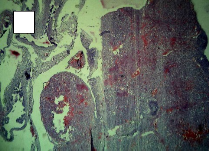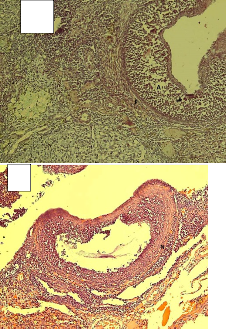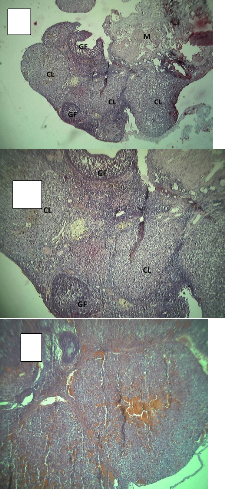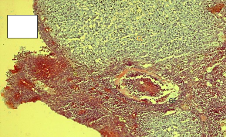
International Journal of Scientific & Engineering Research, Volume 5, Issue 4, April-2014 1485
ISSN 2229-5518
Smokeless tobacco is unburnt
Tobacco use is the notable cause of death all over the world. These deaths have been attributed to multiple tobacco related conditions, including heart disease, cancer, chronic pulmonary disease and stroke. Statistics show that the average age of first time tobacco user in the world is now between 13 – 15 years( Backinger, c.l etal 2003, Cooke, J.P. etal 2004).
tobacco which is placed into the vestibule of mouth. The chewing type of smokeless tobacco consists of crudely divided tobacco leaf that is mixed with sugar and molasses and packaged in a pouch. A “quid” or “chaw” of the tobacco is either chewed or sucked. During its stay in the mouth smokeless tobacco continuously releases toxic chemicals which have local effects and also enter the blood stream to reach the organs like brain, heart, pituitary gland, adrenal cortex, ovaries &
uterus(Bombard, j. M. etal 2007).
IJSER © 2014 http://www.ijser.org
International Journal of Scientific & Engineering Research, Volume 5, Issue 4, April-2014 1486
ISSN 2229-5518
Smokeless tobacco contains higher quantities of nicotine than most cigarettes. Nicotine is the principle alkaloid found in tobacco and is believed to be the main reason for its use since many people derive satisfaction by its use(Cristine, d.d. etal 2011)
Infertility is one of the most common problems with significant medical and psychosocial concerns. There are various factors responsible for male and female infertility. (Sanders etal., 2002). Use of tobacco is associated with low fertility rates, poor reproductive outcomes and increased risk of in vitro fertilization failures. Over the past few decades the prevalence of tobacco among women of reproductive ages has increased. (Dechanet C et al., 2010)
Tobacco is harmful to the ovaries and may lead to infertility. Tobacco use impairs every stage of the reproductive process. (B. O. Iranloye et al., 2007,
2009).Studies have shown the antiovulatory and abortifacient effects of the smokeless tobacco (Kumari etal.,
2010).
The study was case control. It was conducted at Animal house Sindh Agriculture University Tando Jam. 30
adult non pregnant female Swiss albino
rats were used which were confirmed for adulthood by vaginal swab test ( Jyoti et al., 2010).The animals were housed under hygienic conditions. They were provided with laboratory chow diet & distilled water ad libitum. The room temperature was
maintained at 22⁰C ±2⁰C & 12 hrs Light /
dark cycles were observed (Browman et
al.,2005).The experiment was carried out for 30 days. Rats were divided into three groups comprising of ten rats each. The groups were taken as control (A), experimental group B(5%) and experimental group C(10%).
For the experimental groups B&C locally available tobacco was purchased. It was grinded and mixed with the raw diet at the rate of 5% & 10% of their diet.The weight of all the animals was checked weekly. The growth rate of the animals was calculated by using the following formula Growth rate: weight in grams at 4th week
– weight in grams at zero week. The animals were sacrificed on 31st day by cervical dislocation. The ovaries were removed and weighed. The organs were then placed in 10% formaldehyde solution and were prepared for light microscopy. The blocks were sectioned to a thickness
of 5µm. The slides of all tissues were
IJSER © 2014 http://www.ijser.org
International Journal of Scientific & Engineering Research, Volume 5, Issue 4, April-2014 1487
ISSN 2229-5518
stained by using Hematoxylin and eosin
stain and Trichrome stains.
The statistical analysis was done by using SPSS version 16.0. Chi- Square test and student-t test were applied to compare different groups.
A marked reduction in the weight of the animals of Group B and C was noted( Table No.01). The mean of the Group A was found to be 2.13±1.27gm. However the body weight of Group B and C was found to be 1.98 ±8.97 and 1.55 ±1.89 respectively. These findings were found to be highly significant when analyzed for comparison between Group A and C using chi- square and student t- test (p- value < 0.05) but were found to be significant when compared between Group A and C.
A highly significant reduction in the weight of the ovaries was observed in the experimental groups C with a mean value of 0.025 ± 0.005 gm. as compared to the controls having mean of0.128 ±
0.013gm(Table No 02)
Table No. 02. Comparison of ovarian weight between Group A and C using Student t-test p-value<0.05 *
Statistics | p- Value* | ||
Statistics | Group A (n=10) | Group C (n=10) | |
Mean | 0.128 | 0.025 | 0.001 |
Std. Dev | 0.013 | 0.005 | 0.001 |

IJSER © 2014 http://www.ijser.org
International Journal of Scientific & Engineering Research, Volume 5, Issue 4, April-2014 1488
ISSN 2229-5518
![]()
![]()
:Healthy follicles :atretic follicles
![]()
![]()
:stromal change :corpora lutea
Under H&E staining, the ovaries of the control rats showed multiple follicles in various stages of development occupying the cortex. Multiple corpora lutea are also visible ( Photomicrograph a). The ovaries of the rats of Group B showed mildly decreased number of healthy follicles. Reduction in the number of corpora lutea was also observed .(photomicrograph b). The ovaries of experimental group C showed multiple cystic and degenerated follicles in various stages of development (photomicrograph c).Increased number of atretic follicles were also seen. Hemorrhage within the ovarian stroma was noted(photomicrograph d) The no. of corpora lutea was markedly reduced. Apoptotic changes in the granulosa cells were visible. Multiple degenerated granulosa cells characterized by vacuolated cytoplasm and dense nuclei were also observed (photomicrograph d& e)
Ovaries of the rats of Group C when viewed under trichrome stain showed increase in fibrous tissue in stroma especially around the maturing follicles.
Marked fibrosis around the graaffian follicle accompanied by necrosis in the granulosa cells of the follicles was also observed. (photomicrograph f&g & Bar Chart No 01)
In this study the observed reduction in the ovarian weight clearly states that there is inhibition of ovulation due to the administration of smokeless tobacco in the albino rats. Few mature graafian follicles and reduced number of corpus luteum are also indicative of the same findings. These findings are in agreement with the work done by Tuttle et al., 2009, Neal et al., 2007 .The primordial follicles and follicular growth appears to be sensitive to the components of tobacco. Degenerative and atrophic changes were observed in the granulosa cells. There were marked vacuolations appearing in the ovarian stroma. The apoptotic changes were also visible in the granulosa cells. Research done by Jurisicova et al., 2007 also suggests that ovarian tissue retains tobacco compounds leading to the consequences of follicular loss, follicular atresia and necrotic
changes in the granulosa cells of the
IJSER © 2014 http://www.ijser.org
International Journal of Scientific & Engineering Research, Volume 5, Issue 4, April-2014 1489
ISSN 2229-5518
rodents when treated with different form of tobacco.
Based on the histological findings in this study it can be easily stated that the exposure to the oral smokeless tobacco alters stages of the ovulation in the Swiss albino rat and may lead to the pathology of this tissue as well if given for a longer duration.
In the light of present study it is recommended that measures should be taken to encourage females in the reproductive age to stop use of smokeless tobacco. Education about the effects of tobacco at adolescent level should be provided.The proper implementation of already existing tobacco laws should be sorted out. For further studies the effects of smokeless tobacco on the fertility rate and its effects on the fetal outcomes are also necessary to be carried out.
BACKINGER, C.L., FAGAN, P., MATTHEW, E and GRANA, R (2003) Adolescent and young adult tobacco prevention and cessation: current status
and future directions. Journal of Tobacco
Control, Vol.12, pp. 46-53.
BOMBARD, J. M., PEDERSON, L.L., NELSON, D. E and MALARCHER, A.M. (2007) “Are smokers only using cigarettes? Exploring current polytobacco use among an adult population,” Journal of Addictive Behaviors, Vol. 32, No. 10, pp. 2411–2419.
COOKE, J.P and BITTERMAN, H. (2004) Nicotine and angiogenesis: a new paradigm for tobacco-related diseases. Annals of Medicine, Vol. 36, pp. 33-40.
CRISTINE, D.D., STEINBERG, B.M., HUDSON, S.V., ULPE, R and Di Paola, R.S (2011) Epidemiology of Cigarette and Smokeless Tobacco Use among South Asian Immigrants in the Northeastern United States. Journal of Oncology Vol.
2011, Article ID 252675, 8 pages
DECHANET, C., ANAHORY, T., MATHIEU, D.J.C., QUANTIN, X., REFYTMANN, L., HAMAMAH, S., HEDON, B., DECHAUD, H (2010) Effects of cigarette smoking on reproduction. Journal of Human Reproduction, Vol. 17, No.1, pp. 76-95.
IJSER © 2014 http://www.ijser.org
International Journal of Scientific & Engineering Research, Volume 5, Issue 4, April-2014 1490
ISSN 2229-5518
IRANLOYE, B.O and BOLARINWA, A.F. (2009). Effect of nicotine administration on the weight and histology of some vital organs in female albino rats. Nigerian Journal of Physiological sciences. Vol.
24(1), pp.7-12.
IRANLOYE, B.O and BOLARINWA, A.F. (2007).Effect of nicotine administration on estrous cycle in female rats. Nigerian Journal of Health and Biomedical Sciences, Vol. 6, pp. 21-25.
Jurisicova A, Taniuchi A,Li H, Shang Y, Antenos M,Detmar J, Xu J, Matikainen T, Benito Hernandez A, Nunez G,et al.(2007) Maternal exposure to polycyclic aromatic hydrocarbons diminishes murine ovarian reserve via induction of Harakiri. The Journal of Clinical investigation. Vol.
117, pp.3971-3978.
KUMARI, A., MOJIDARA, B.N. (2011). Reproductive toxic potential of panmasala in Swiss Albino mice. Journal of Toxicology Indian Health. Vol. 27(8), pp.
683-690.
NEAL, M.S., HUGHES, E.G., HOLLOWAY, A.C and FOSTER, W.G.(2005) Side stream smoking is equally as damaging as mainstream
smoking on IVF outcomes. Journal of
Human Reproduction, Vol. 20, pp. 2531-
2535.
SANDERS, S.R., CUNEO, S.P.,TURZILLO, A.M. (2002). Effects of nicotine and cotinine on bovine theca interna and granulose cells. Journal of ReproductiveToxicology. Vol. 16(6), pp.
795-800.
Tsutsumi R, Hiroi H, Momoeda M, Hosokawa Y, Nakazawa F, Yano T, Tsutsumi O, Taketani Y.(2009) Induction of early decidualization by cadmium, a major contaminant of cigarette smoke. International Journal for fertility and sterility. Vol.91, pp.1614-1617.
IJSER © 2014 http://www.ijser.org
International Journal of Scientific & Engineering Research, Volume 5, Issue 4, April-2014 1491
ISSN 2229-5518


b a

d c

e
f
(a) showing ovary (O) and oviduct (OD)
g under H & E X100.(b) from Group B
showing multiple corpora lutea (CL), Graafian follicle (GF) and medulla (M) under H&E X 100.(c) from Group B showing multiple corpora lutea (CL), Graafian follicle (GF) and medulla (M) under H&E X 400.(d) from Group C showing atrophied corpus luteum (CL), Graafian follicle (GF) and Hemorrhage (H) under H&E X 100.(e)from Group C showing atretic Graafian follicle (GF)
under H&E X 400.(f & g) from Group C showing apoptosis(A) within granulosa cells and fibrosis (F) around the graafian
follicle under Trichrome stain X 400
IJSER © 2014 http://www.ijser.org